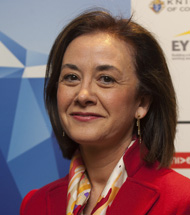"La calidad universitaria exige ser excelente en algo propio"
Así lo ha afirmado hoy en la Universidad la profesora Concepción Naval durante la jornada de apertura del congreso internacional sobre reputación de universidades

"No se puede ser excelentes en todo. Es preciso contar con un proyecto único, relacionado con la identidad y misión de la institución". Así lo ha firmado hoy en la Universidad de Navarra Concepción Naval, presidenta del comité organizador del congreso internacional sobre reputación de universidades. Al encuentro, inaugurado esta tarde, asisten más de 300 personas, que representan a 92 instituciones y participan 48 ponentes, todos procedentes de 18 países.
"Ser excelentes en algo propio", es, según la experta, una de las claves para que la universidad consiga en la actualidad sus principales fines, que son "la excelencia en la docencia, la investigación y la transferencia del conocimiento".
Junto a la diferenciación, Concepción Naval, decana de la Facultad de Educación y Psicología, se ha referido a otros cinco retos: "Conseguir los necesarios fondos de financiación públicos y privados; generar un sentido de pertenencia en toda la comunidad universitaria; una gestión estratégica de la comunicación; crear una red de relaciones nacionales e internacionales; y una apertura al entorno con actividades de extensión universitaria".
Asimismo, ha señalado que la calidad supone promover la mejora personal, más allá del logro de unos indicadores externos de calidad. "La calidad pretende resultados y estos son condición imprescindible para la supervivencia de la organización. Sin embargo, sería un error confundir la calidad con el éxito. Los indicadores externos son condición necesaria o conveniente, pero no suficiente para lograr la calidad en sentido radical".
"Lo que no se evalúa se devalúa"El congreso Building Universities' Reputation 2015 ha sido inaugurado por Alfonso Sánchez-Tabernero, rector de la Universidad de Navarra; el consejero de Educación del Gobierno de Navarra, José Iribas; y el vicerrector de Comunicación del centro académico, Juan Manuel Mora.
El rector ha destacado que en estos momentos de cambio e incertidumbre la universidad "no tiene que poner el énfasis en lo accidental, sino seguir mirando a lo crítico: la educación, la investigación y la transferencia de conocimiento a la sociedad. Así es más fácil que la innovación y la creatividad no produzcan disfunciones".
Por su parte, el consejero José Iribas ha subrayado la importancia de la reputación de cada universidad, pero también la del sistema universitario en el que se inserta. "En Navarra tenemos motivos para estar satisfechos puesto que poseemos un sistema sólido, acreditado, cooperativo, que forma profesionales cualificados y que apuesta por la internacionalización, sin perder las raíces". Sin embargo, ha apuntado que todos hemos de buscar la excelencia y conseguir que las instituciones aporten lo mejor de sí a la sociedad. "Es necesario evaluarse para ver las debilidades y fortalezas y así poder mejorar. Porque lo que no se evalúa se devalúa".
Por último, Juan Manuel Mora se ha referido al tema del congreso, que tuvo dos puntos de partida: el actual debate sobre los rankings y la discusión sobre la necesidad de cambiar de modelo de universidad, que ha tenido lugar tanto en España como en otros países. Estos debates, según ha señalado, conducen a nuevas preguntas, como por ejemplo "en qué consiste la calidad de la universidad, cómo se gestiona la reputación universitaria y qué merece ser medido y evaluado".
En la jornada de hoy también ha participado John Haldane, director del Centro de Ética, Filosofía y Asuntos Públicos de la University of St Andrews, con una ponencia titulada "El estudiante en el centro de la actuación educativa universitaria".
También ha tenido lugar una mesa redonda sobre "La reputación de las universidades en un escenario global", moderada por Pilar Lostao, vicerrectora de Relaciones Internacionales de la Universidad de Navarra y en la que han participado Jaume Pagés, consejero delegado de Universia; Manuel J. López, presidente de la CRUE (Conferencia de Rectores de Universidades Españolas); y Lidia Borrell-Damián, directora de Investigación e Innovación de la European University Association (EUA).
El congreso ha contado con el apoyo de instituciones como la CRUE, Universia, la Fundación Europea Sociedad y Educación, Corporate Excellence, CASE, el British Council, World 100 Reputation Network y DIRCOM. La ponencia preparatoria o position paper ha corrido a cargo de los sociólogos Víctor Pérez-Díaz y Juan Carlos Rodríguez, precisamente el catedrático Pérez-Díaz ha recibido este año el Premio Nacional de Sociología y Ciencia Política.



